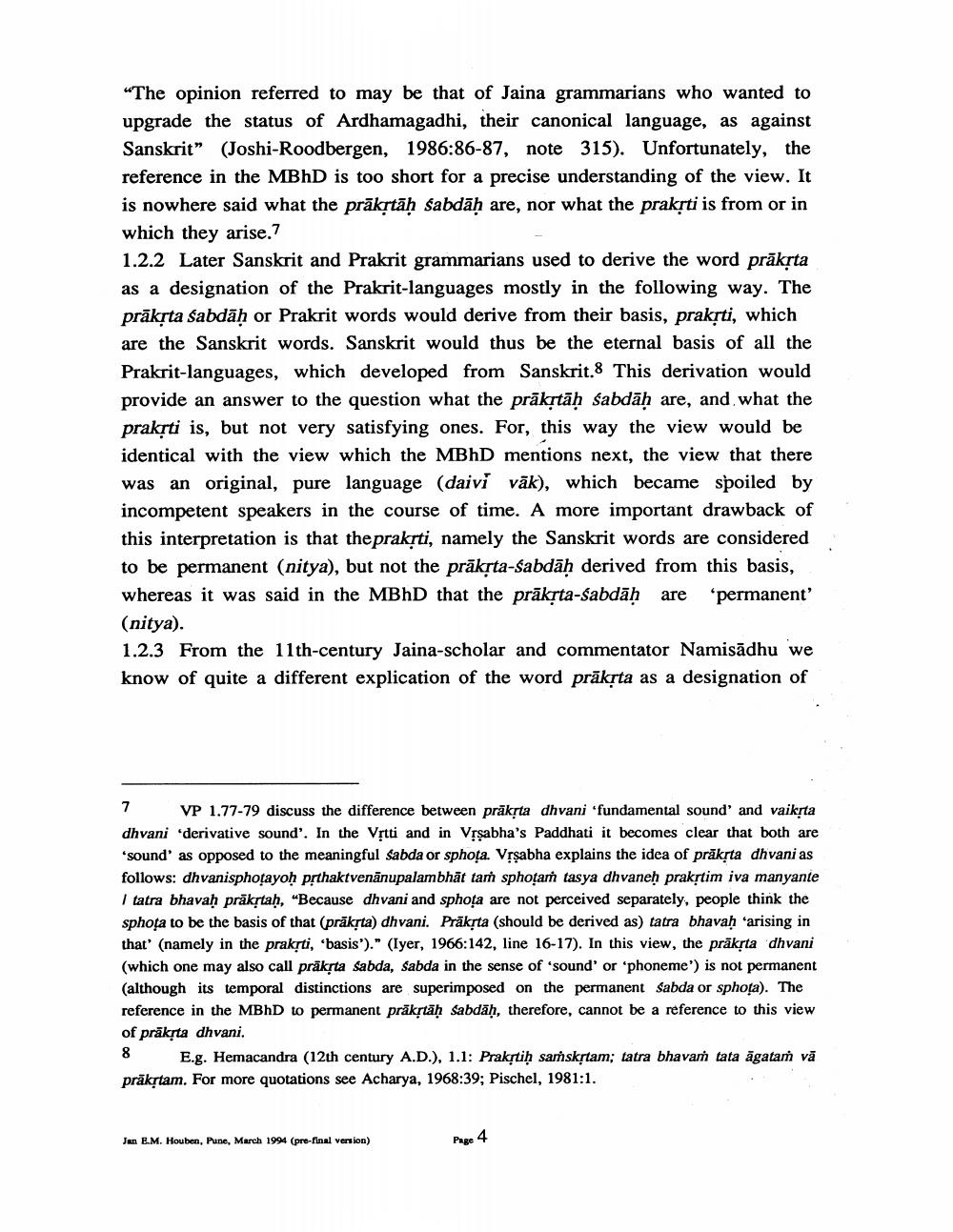Book Title: Bhartrharis Familiarity With Jainism Author(s): Jan E M Houben Publisher: Jan E M Houben View full book textPage 4
________________ "The opinion referred to may be that of Jaina grammarians who wanted to upgrade the status of Ardhamagadhi, their canonical language, as against Sanskrit" (Joshi-Roodbergen, 1986:86-87, note 315). Unfortunately, the reference in the MBHD is too short for a precise understanding of the view. It is nowhere said what the prākştāḥ sabdāḥ are, nor what the prakrti is from or in which they arise.7 1.2.2 Later Sanskrit and Prakrit grammarians used to derive the word prāksta as a designation of the Prakrit-languages mostly in the following way. The prākrta sabdāh or Prakrit words would derive from their basis, prakşti, which are the Sanskrit words. Sanskrit would thus be the eternal basis of all the Prakrit-languages, which developed from Sanskrit.8 This derivation would provide an answer to the question what the prākịtāḥ śabdāḥ are, and what the prakệti is, but not very satisfying ones. For, this way the view would be identical with the view which the MBhD mentions next, the view that there was an original, pure language (daivi vāk), which became spoiled by incompetent speakers in the course of time. A more important drawback of this interpretation is that the prakrti, namely the Sanskrit words are considered to be permanent (nitya), but not the prāksta-śabdāḥ derived from this basis, whereas it was said in the MBhD that the prāksta-sabdāḥ are permanent' (nitya). 1.2.3 From the 11th-century Jaina-scholar and commentator Namisādhu we know of quite a different explication of the word prākṣta as a designation of 7 VP 1.77-79 discuss the difference between prākrta dhvani "fundamental sound and vaiksta dhvani 'derivative sound'. In the Vrtti and in Vrsabha's Paddhati it becomes clear that both are 'sound' as opposed to the meaningful sabda or sphoța. Vrşabha explains the idea of prākȚta dhvani as follows: dhvanisphotayoḥ prthaktvenānupalambhāt tam sphoța tasya dhvaneh prakstim iva manyante I tatra bhavaḥ prākştaḥ, "Because dhvani and sphoța are not perceived separately, people think the sphota to be the basis of that (prāksta) dhvani. Prākta (should be derived as) tatra bhavah 'arising in that' (namely in the prakti, 'basis')." (Iyer, 1966:142, line 16-17). In this view, the prākrta dhvani (which one may also call prākta sabda, sabda in the sense of 'sound' or 'phoneme') is not permanent (although its temporal distinctions are superimposed on the permanent sabda or sphota). The reference in the MBhD to permanent prākstāḥ sabdāḥ, therefore, cannot be a reference to this view of prākta dhvani. 8 E.g. Hemacandra (12th century A.D.), 1.1: Prakrtih sanskrtam; tatra bhavam tata āgatam vā prakstam. For more quotations see Acharya, 1968:39; Pischel, 1981:1. Jan E.M. Houben, Pune, March 1994 (pre-final version) 1 Page 4Page Navigation
1 2 3 4 5 6 7 8 9 10 11 12 13 14 15 16 17 18 19 20 21 22
